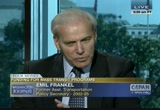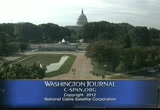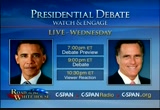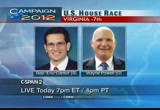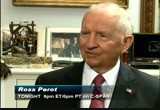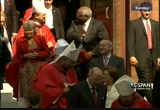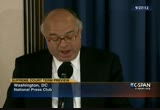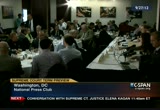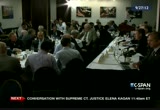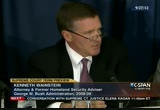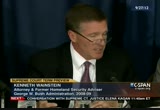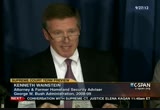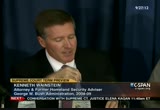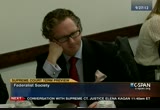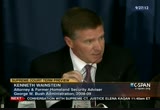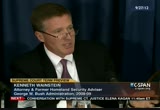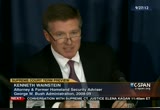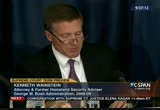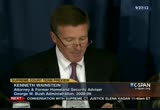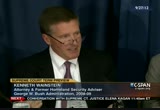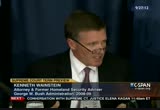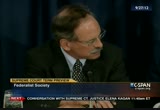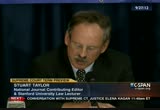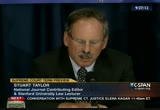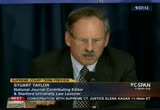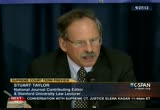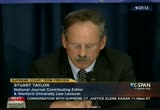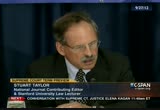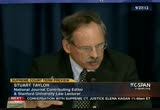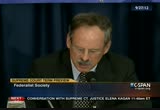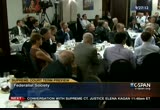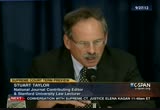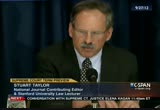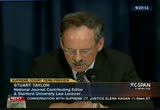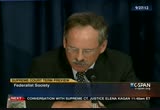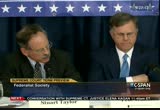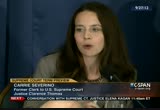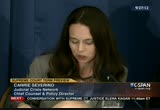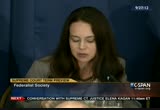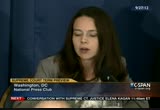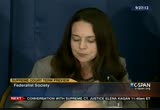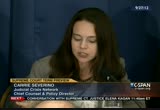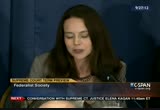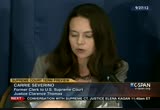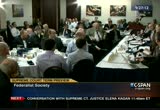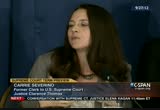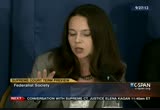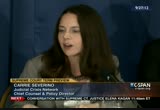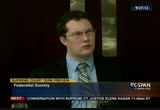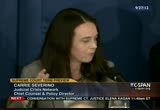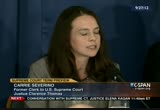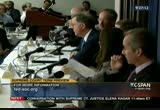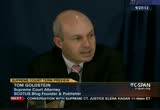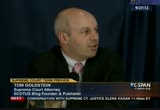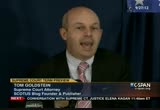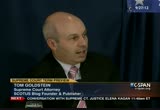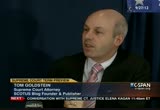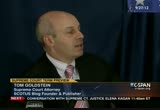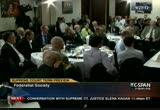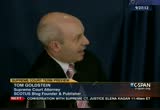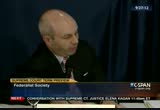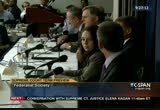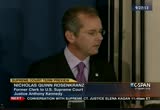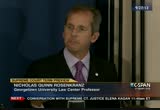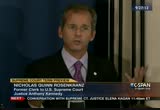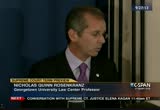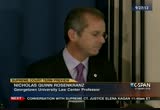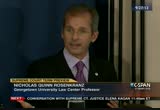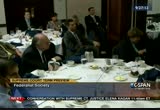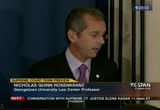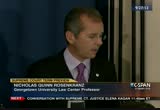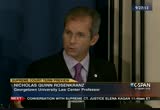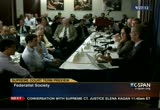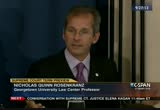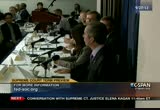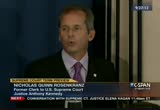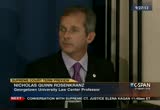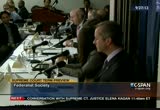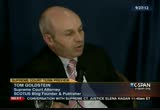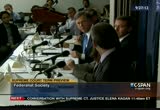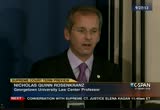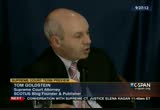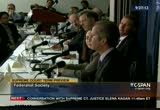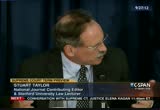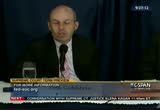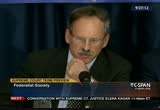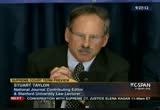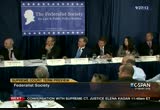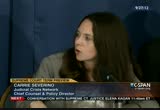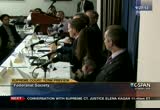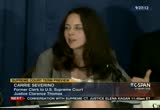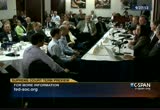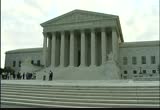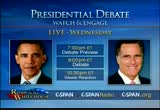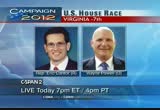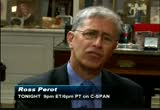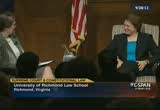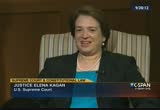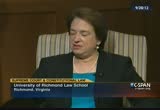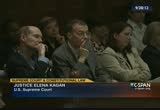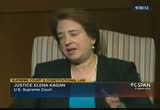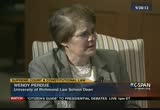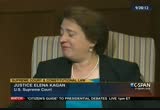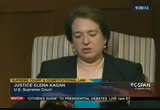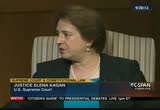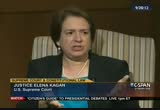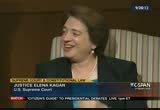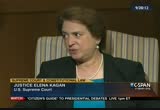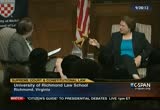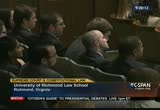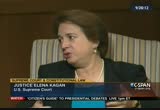tv Politics Public Policy Today CSPAN October 1, 2012 10:00am-12:00pm EDT
10:00 am
but there are rural bus systems that are allowed to get operating money spirit there is -- operating funding. capital funds are not available from the federal government about will certainly mean less money available for operations and maintenance. he is currently the visiting. thank you for your time. >> thanks. we appreciate all your calls. we are up every day at 7:00 eastern time. we will be back here tomorrow. we look forward to hearing from me. [captioning performed by national captioning institute] [captions copyright national cable satellite corp. 2012]
10:01 am
>> i will finally do something the president has not been .illing to do pe >> we have been winning those cases. >> he moderates from the university of denver. what with our live debate preview followed by two ways to watch the debate at 9:00. both candidates on screen comedy the entire debate. following, your reactions. follow our live coverage and on-
10:02 am
line ads c-span.org. >> the national can indication association is hosting a panel discussion on scholars about how to watch the debate and what you're should look for. the this starts at 1:00 p.m. eastern. to that we continue our live campaign 2012 coverage with three congressional debates. a 7:00 eastern we look good to the university of massachusetts scott brown and elizabeth warren face off. he can see that here and c-span. that will be followed at 8:00 for the open senate seat in nebraska. on c-span2, eric cantor will square off for the race for
10:03 am
california seventh district. it will be on c-span2. >> every generation there are history has worked and sacrificed to leave a better country to their children and grandchildren. we were then spending their money. we are much more spending their money. we are leaving them a mess. it to be very difficult to deal with. if we are that week, just think of who want to come here for. we're seeing our country taking over. we're so we cannot do anything. we are moving in that direction. we have got to start fixing this now. otherwise it is a disaster. we could even lose our country. >> ross perot interviewed by
10:04 am
richard wolfe and how it has changed since he ran for president in 1992 and 1996. by his article in today's edition of "usa today" ross perot tonight on c-span at 9:00 p.m. eastern. >> of the archdiocese of washington red mass yesterday marking the start of the new term. it is named after the color of the garments help buy the claridge held on the sunday before the court held this. six of the nine attended yesterday's services of st. matthew the apostle. including chief justice john roberts as well as scalia, elena kagan and clarence thomas.
10:05 am
>> on friday, the federalist society how the discussion previewing the supreme court term. they will consider a challenge to the 1965 voting act, at the legality of a surveillance program, and an affirmative action case. from the national press club, this is about 1.5 hours. >> good afternoon. i am doug cox. welcome to our september luncheon. today's event is sponsored by the societies practice group,
10:06 am
the lawyers chapter in the faculty division. our program is a little different from the regular lunches that take place in chinatown. there is no kung po on the menu. the new supreme court term promises to be one of those very important things. we have pulled together an all- star panel of experts to give us their thoughts and insights. our moderator today is pete williams. he is well known for being one of the first journalists along with his colleague to get this right on that december evening with the decision came down. we're grateful he is here today. >> each of our panelists has a set of want to talk about.
10:07 am
whole time. >> into 2006 he became the first lawyer to fill a position, -- and is now in private practice. ken, please. >> i always thought it was dangerous to be on a panel that starts with a reference toi have been asked about three cases, and national security case, and then other cases. clapper vs. amnesty international, a standing case
10:08 am
related to a challenge of the amendment of the foreign intelligence surveillance act that was passed in 1978. you have to understand the merits of little bit. >> for those watching on c-span, what is standing? to appear in court and challenge contact with people overseas, people who might be the subject of electronic surveillance by the federal government, and they are challenging the law that allows this because they are concerned their communications will be picked up.
10:09 am
up, and in the course of that surveillance, they have the right to challenge that in court. that is the standing issue. to get to the merits, fisa passed in 1978, and in the aftermath about abuses, it set up a system by which the executive branch would have to go to the court in d.c. and get permission when they wanted to do wiretapping for national security purposes. this is a way of making sure the court -- it had a check and a role in reviewing the efforts to do this wiretapping, which had
10:10 am
designed in 1978 is congressthe problem is that in defining the parameters of what communications -- surveillance required court approval. the statute referred to the technology at the time, those communications that were wired, radioed, or satellite technology. since 1978 we have seen a dramatic change of the technology of communications, particularly fiber optic cable, which has changed the court they try to get this case in electronic surveillance.
10:11 am
the result is that leading up to 9/11 there are many instances where the government would have to go to get an order from the fisa court before they could wiretap communications overseas. that was not the intent of fisa originally. the amendment of 2008 was meant to address that problem. what it did was say that if the government is trying to surveil somebody overseas and they have a reasonable basis to believe that person is overseas and not in the united states, they do not have to go to the court for a particular provision. that was what was different about the 2008 statute, because it allowed the government to go forward with communications surveillance for a number of people without having to get special permission for each and every communication. the problem is that for people
10:12 am
like the plaintiffs in this case, that meant their communications might get swept up as well, even though they were in the united states by merit of communicating with somebody out there. the merits will be fought out someday, but a couple questions here as to whether or not there is a foreign intelligence exception to the requirement, and the fisa court found that there is. the supreme court has not ruled on that, whether this communication, whether it is reasonable, or if it has not satisfied the requirement, if it is reasonable. the issue is one of standing. the plaintiffs say they have
10:13 am
standing because they are being incidentally wiretapped because they are communicating with people overseas. they are having to travel to meet these people in person, like their clients who are overseas, to avoid being intercepted. therefore, they are spending money having to travel, and it is because of their concern of what they say to their clients might get picked up. that is the injury they claim they have. the government says that injury is illusory. it is no different than maybe an attorney for a mafia crime family who will challenge the criminal wiretaps statute because of the concern of the mafia clans might be picked up in wiretaps. you have no right to challenge an otherwise valid communication by electronic surveillance
10:14 am
because you might incidentally get collected. the government says there is the standing, no injuries that they can cite that they would to go to court. the stakes are the following -- one, if standing is found and the court case goes forward, that would undermine a valuable collection effort. the fisa amendments act is up for reauthorization this year, and the attorney general has filed a letter saying it is enormously important in the effort against terrorists and other foreign threats. a second concern is that if they find standing in this case, that would probably lead to other challenges by people who have lesser injuries to be able to cite that would mean that more cases would come into court where intelligence programs are being challenged, there would be secrets about those intelligence programs, and that would undermine national security. the last issue and the most global in import is if standing is found in this case, it is more likely that a similar case
10:15 am
would be brought to the court and more likely that judges as opposed to legislatures or the executive branch would regulate these policy issues about compliance that should be drawn around intelligence programs. that would be a shift in the separation of powers and the thing that would be on the forefront of the minds of the justices when they decide this. that is the national security case. another case is bailey vs. united states. the question is the extent of the ruling in 1981, called michigan vs. summers, that says if law enforcement agents find occupants at any premises, they can detain the occupants while they execute the search warrant. the police followed that person some distance and stopped that person away from the premises. in this case what happened is you had a defendant -- an
10:16 am
informant come forward and say there was drug dealing at a certain location, police got a search warrant, they surveiled the house, saw a man fitting the description of the person the informant had said was a drug dealer operating out of the location. that man left with another man, got in a car, and drove away. the police followed them and stopped them. the police brought him back, and the search had been conducted, and officers had found guns and drugs in the location, and they arrested him. the evidence seized in the house -- he claimed he had been stopped illegally.
10:17 am
10:18 am
are a danger to police, keeping people who are on the premises from distracting the police while they're doing a search, and keeping people from fleeing. they said we had driven away. you did not have to worry about flight because we did not even know the search warrant was happening. the government policy response is in this day and age everybody has a cell phone, could have gotten a text, gotten a gun out, and taken on the police officer. there is the same concern about disrupting the search because they could have come back and gotten in the way of the search. the government is advocating that so long as they stop the person as soon as reasonably practicable, the rule of summers applies. the significance is what the government is proposing is a further extension of the ability to detain somebody incident to a search warrant. just as we have seen in the reverse through the years, there has been an expansion of the right to search. seeing the same thing in this area. a footnote, this might be a pyrrhic victory for the defense if they win because even if they win with the summers issue,
10:19 am
the government can still argue that it was a legitimate, they had a reasonable suspicion, and, therefore the evidence obtained could still be admissible. i was asked to talk about another case which is a case -- >> why don't you take a minute and a half? >> maryland vs. king, and the question is here to the liberty of the state and federal laws that allow for the collection of swabs of cells from the insides of mouths of people who have been arrested. there as 27 states who have laws allow officers to swab the inside of any mouth of anybody arrested, and that gets put into the system who helps to identify the person, but also connect them to other crimes.
10:20 am
in this case in maryland, king was arrested for burglary, swabbed, it comes back with a hit for a case involving rape. the court of appeals ultimately found it should have been suppressed, thereby invalidating the law in maryland which is the law in 26 other states allowing that swabbed people are arrested. they did a balancing of that defendant's privacy. i can think what factors are here.
10:21 am
how intrusive is it? a swab in the mouth. this process subjected the defendant having his whole dna profile be exposed to the government, and that that was an intrusive search that should not be allowed. the state responded the defendant's interest is not that strong, and in fact, they -- when you do a profile, they do not determine anything about the genetic characteristics, it is just matched against other samples. the government is arguing that aside the fact that defendant's interest is not that strong, the government's interest is strong, because they need to identify the person arrested, but also the ability to get the swabs to bounce it off a database around
10:22 am
the country to see what other crimes this person may have committed. that is the argument. the stakes are high, because that process has been tremendously important, both at finding people and incriminating them for crime, but also exonerating people for crimes they did not commit. >> thank you. if you have not run into commentary by our next panelist, you do not get out much. stuart taylor has written about legal affairs for every big- name publication. he is a princeton graduate and heat sometimes practices what he preaches as a lawyer. he was one of the first to warn against the rush to judgment in a case, and now he has a new
10:23 am
book about affirmative action called "mismatch: affirmative action at war with itself." it is kind of him to summarize the entire book in the title. he is the co-author -- -- >> you do not need to buy it. >> stuart, why don't you start with that. >> this requires a confession of bias, but also helps me with homework. the case is the first affirmative action case the court has heard since 2003, which will be argued on october 10. i will spend time on another
10:24 am
case which is a workplace harassment case. we argue in the amicus brief that black students are often harmed by racial preferences by being put in academic environments without warning. they are ill-prepared to compete with some of the most competitive students in the country. we also argue under principles previously established by the supreme court, the university texas' racial preference system at issue in this case is unconstitutional, although there are respectable arguments both ways, and i think the reason -- the reason i think fisher is a good bet to become the most important affirmative action case ever is simply the change in composition of the court since the last affirmative action case in 2003 and the two university of michigan cases. the court split 5-4, opening the door wide as long as quotas
10:25 am
are avoided, as long as things are holistic, to large racial preferences in admissions, and has served as a model for universities around the country at every level, medical, law school, to expand their use of racial preferences, even though it is reported to lay down principles that would restrain the use of racial preferences. the reason we think they will not is that justice sandra day o'connor retired in 2005, was replaced by justice alito, who clearly is a vote against racial preferences and so now we have four solid votes in favor of racial preferences, four votes against racial
10:26 am
preferences, and the more conservative justice kennedy who has set in so many cases right middle. in gruder, kennedy joined the majority in one critical point, that racial diversity as educational benefits that are substantial enough to make it a compelling interest that there is justifying the use of racial preferences if necessary to get this kind of racial diversity. kennedy dissented forcefully the narrow tailoring requirements. he said that the university had failed to show it had met a number of the principles that the majority had laid down and that the majority had given far too much difference to the university's claims. the principles are briefly that racial preferences should not be restored it to until race-
10:27 am
neutral alternatives have been exhausted to serve the interests of racial diversity, that racial balancing is absolutely barred, and the context suggests the court means seeking to mirror the proportion of various groups in the population at large, either nationally or in the state, and also that racial preferences should not be perpetual. the court said in 25 years we expect this will not be necessary anymore. that is 2028. the logical application of the statement in gruder was that universities would not wait until the last day of the 24th year and then just stop. but there has been no sign that any university in the country i know of has been slowing down its use of racial preferences. if anything, the contrary.
10:28 am
there is some internal tension within the gruder opinion that will be worked out somewhat in fisher. so large are the stakes that hundreds of organizations representing every major establishment, institution in america, from educational establishments to corporate america and a lot of military people, all weighed in on the side of the university of texas. the establishment is totally bought in to racial preferences for better or worse for it by contrast -- and that is 173 organizations in this brief. 17 briefs have been filed on the other side. this might illustrate a stunning disconnect on the racial preference issue between the establishment institutions, the people who run institutions who have various reasons to want a formula for racial peace, and
10:29 am
the american public at large, which has always disapproved by racial preferences by wide margins in any poll that makes it clear how they operate. just a moment. five of the current justices would have struck down the university of michigan regime that justice o'connor upheld, justice kennedy being the fifth. he has never said that racial preferences should be banned entirely. to the contrary, he says that there may be a compelling interest in some way somewhere. he has never identified such a case where -- the issue in one sense in this case is whether kennedy will think this case
10:30 am
meets either greater justification for racial preference than the university of michigan law school case, or if it establishes a precedent he is bound to follow. one interesting thing, because there was a lot of talk, that while the court would not have granted this case, they did not have to pick it had standing problems. i was assured by supreme court experts there was not a chance they would grant it. i am a little sore at them because when they granted it it ruined my book publication schedule. when they did, some people said obviously they are granting this in order to take a whack at affirmative action. why else would they do it? i have said that. i remind myself, it only takes four votes to grant the case. did kennedy vote to grant this case? is he eager to whack affirmative action? we will not know that for a while. maybe you'll find that on october 10. maybe four justices who want to take a whack cited this was the
10:31 am
only train that was going by for a while, and if justice kennedy would say no. the argument that these preferences pass muster under gruder was upheld by a unanimous panel by the fifth circuit of appeals, including a reluctant judge whose opinion said, "i hate racial preferences, but the supreme court has tied my hands and left me no choice, so i have to uphold them." seven of the 16 judges of the fifth circuit voted to grant rehearing, said they did not think gruder tied their hands. even i cannot whack these racial preferences, so you will have to give me more ammunition. there are strong arguments on
10:32 am
both sides. the best argument for texas is the court said you cannot have numbers, quotas. we do not have anything. not that many people are involved here. the number of kids admitted based on individual or racial preferences to the university of texas on top of that 10% plan, which is not at issue, and the challenge to the requirement to the requirement that the top 10% of any high school be admitted, that the number admitted on top of that, blacks and hispanics, based on racial preferences is not large is true. the argument coming back to the other side most specific to gruder are the university of
10:33 am
texas has set a target of approaching representation of the population per proportional representation. we need more hispanics. we need fewer asians by implication because they are already represented. that sounds like racial balancing. the court said in gruder -- o'connor said no racial balancing. i guess you can say that they have not yet engaged in racial balancing at the university of texas.
10:34 am
but they also say they want critical mass, in a substantial representation of minority students, not just at the university, but in every class. to get from here to critical mass in every class would take 50 years, 100 years, two hundred years. i don't think it will get done within the remaining 16 years of the 25 that justice o'connor and krueger said should be the limit. it could go either way depending on which threat of analysis he wants to take on. and then i have one other case. i will leave that case now. one other point i might make on that case, on the arguments that fisher makes, they are adding individual preferences to a state law that had already achieved a 10% plan, substantial racial diversity, by admitting the top 10%. and also, they used extremely large double standards in admissions. hi think the public may not realize how large the standards are. and that, quadruple standards, with blacks being preferred over hispanics, with both groups being preferred over whites.
10:35 am
among freshmen entering duty in 2009 who were ed -- entering ut in 2009, a staggering 467 point separates the main s.a.t. scores of asians and blacks admitted with the explicit preferences. the racial gaps in high school gpa costs of these freshmen narrowly narrowed the s.a.t. prep. -- s.a.t. gap. these gaps are so large that the kids who are at the low-end of them will have trouble competing. let me turn to the other case. i will summarize. >> very briefly. >> the supreme court precedents render an employer carelessly rubble under title 7 -- based on race, gender or other protected characteristics.
10:36 am
there is a conflict among to the courts of appeals about who is the supervisors of the justices have agreed to review the circuits ruling in advance to clarify the scope of the employer liability. full stop. >> is justice cave in -- is justice kagen taking part in the case? >> it matters cosmetically. there are five votes to reverse. i would imagine that to make your justice kennedy, you might think, well, is it a little unseemly to do something this big without a full court? >> does -- just to state the obvious, if there's a 4-4 tie, the university wins? >> yes.
10:37 am
the reason justice kagen is recuses because she oversaw a brief. >> having been a law clerk for justice clarence thomas, carry severing also went to harvard law and he is the only member of our panel to have this year's late over prepared for life by getting a master's degree in linguistics. this may help her as she writes on the judicial crisis network, an organization that advocates in favor of the confirmation of judicial nominees with conservative values. >> i will have to have mined the agreement with sticks to speak fast here and i have been asked to talk about two categories of cases that don't have grants. one is in the same-sex marriage cases, the defense of marriage cases and the proposition 8 cases and the other is in the voting rights cases.
10:38 am
both of these are likely to be taken on by the courts. we don't know how they will play out because they have not to grant uncertainty in these cases yet. i think they also share some interesting aspects, and those on the relationship between the state and a federal government. first, to turn to the defense of marriage act and proposition 8 cases -- i will talk about doma cases for it. first, for some history on doma, it was passed in 1996 and has two main sections from only one is really at issue in section 2 is about trying to protect states from being forced to recognized marriage in other states. the section that deals with the defense of marriage for federal purposes, federal law, federal taxes, a whole host of bedroll laws.
10:39 am
it says, for the purpose of federal law, the word marriage means of a legal union between one man and one woman, husband and wife, and spouse refers only to a person of the opposite sex. that is the section of the law that president obama has declined to defend. at the house, they have created the bipartisan legal adviser group that is during the defense of these laws since the administration has advocated its role in defending it. -- has abdicated its role in defending it. there are several cases that have petitions for the court to decide amongst. the first one, probably the front runner, is a combination case of massachusetts nurses the department of human services. -- massachusetts vs. the department of human services.
10:40 am
the equal protection clause violates the defense of mayor jack -- or the defense of marriage at-the people protection clause because there is no rational basis for it does not pass scrutiny. the idea of which level of scrutiny it must pass is a question. but they are happy to argue both. this case is interesting because justice kagen was involved at the district court level during her confirmation level where it came out. her office had been involved in the internal discussion of the strategy of the case, so she will be recused in that case. that would make a real wrinkle in the case. the district found that the first circuit also found that the defense of marriage act was
10:41 am
unconstitutional. they ruled on able protection clause and ended up creating a new level of scrutiny. it is a heightened but not officially heightened scrutiny which would be the source of some concern by the supreme court, figuring out which level of scrutiny is appropriate to be used here. this is the only one that has an appellate decision being reviewed. that petition was ready for consideration at the first conference. but they ended of not taking action on it. they seem to be holding onto it. another case that has not had an appellate decision but the government has recommended they do is a case out of california. in this case, you have a district court finding doma
10:42 am
unconstitutional, but they have not had a ninth circuit argument yet. the same day that the department of justice filed in the deal in massachusetts case, it is called the supreme court ruling 11. is rarely granted, but in extraordinary cases where there is overriding national importance, the court does grant these things. in a language they use, they say that a judgment of a court judgment is granted -- i read that as shorthand as please take this case because justice kagen is recused from the other case. we would rather have kagen voting on this case. it is not clear that the department of justice has standing to appeal in that case
10:43 am
because they really one below. they are arguing that the defense ameritech is unconstitutional. the court found the defense marriage act unconstitutional. in that case, the court would be hesitant to take this case. there are two others. one is peterson versus the personnel of office management, a connecticut case. another is a new york case. all of these have been petition for review for the district court. in all the other cases, the petitioner was the one new one below. so this is a series standing problem, or you have steny to
10:44 am
appeal the case, whether you got everything you wanted in the case below. in the windsor case, the marriage was conducted in canada. the question is whether the marriage is valid in new york. they may not be very great vehicles. so it comes down to the massachusetts case and the california case, which has not gone to the ninth circuit yet. the justice department's public doesn't want to take a balance the case because they want kagen sitting in. but i think there are some strong reasons. the court would normally take cases that they have heard the whole appeal. i think the question will be whether the court reviewed the risk of running into a 4-4 decision, which is a serious risk and enough to push them into the equally unpleasant situation of having a case that has not been fully dealt with ahead of time. nonetheless, it seems that the court is holding them all to decide them together. the windsor and peterson cases will be finished briefing at the end of october.
10:45 am
that means the early as conference they can be considered at its november 20. that puts the issue off until after the election. i think it would rather not have the court be part of the election run-up and i think that, if the court had granted on the same-sex marriage in any of these, that factor more into the campaigns than it already has. i think the chief justice would rather have the court lie low in terms of the political realm. with the history of proposition 8, california has several iterations of proposition 22, which said there would be no same-sex marriage in the state. that was found unconstitutional under the california constitution. then the court found that the california constitution already provides for same-sex marriage under the protection clause.
10:46 am
there was a brief time when same-sex marriages were performed in california. simultaneously with that, there was proposition 8 been prepared and then the election the past that with a 52% majority as a referendum to say that amends the california constitution saying that, no, marriages between a man and woman. that presented an interesting history. in this case, it was a sensational trial. there were a lot of allegations about justice vaughn walker, who was the district court judge trying to publicize it. and a lot of questions about his propriety on sitting on the case and how he managed the case. he ultimately ended up coming down, to no one's great surprise, with a very broad ruling, finding that basically same-sex marriage was mandated by the evil protection clause of the constant -- by the equal protection clause of the constitution. you need not marry a member of the same sex. but the state must allow for
10:47 am
same-sex marriage. [laughter] so his ruling was very broad. if he is right, every state cannot define america's only between a man and woman. the ninth circuit took that case and came up with a much more narrow ground. it looks to me that it is brown's uniquely tailored for justice kennedy. judge reinhardt ended up holding it. he basically says, look, we will leave an address whether this test is rational scrutiny as a matter of its cell. but when you already have a state where the law says you eliminate that right for a specific class of people for people who want to engage in same-sex marriage, then it gets a high and rational basis that
10:48 am
we saw in rumor vs. evans. in that there seems to be no reason for that except rhode animus against the class of people that you are removing from this marriage thing. so it makes a difference in their mind that it is removing it from a right that was already there could set aside the fact that the right was there after the california court found it, after this whole history of citizens having passed a friend up trying to block it and the courts continue funneling -- courts continue refining it again. if you have the right and you take away, that is now an equal protection violation. so it has been criticized as a 1-way rajoy. if you have the right to that is not even required by the constitution and you take it away, you cannot do that. i don't know how that is not a one-we ratchet pay but that is a much more narrow ground. that case only applies to the
10:49 am
situation in california. the way it is decided now. the supreme court has not made a call -- it is possible that they would take it. they would probably take it mostly due to shoot them down. if they approve of what they have done, there would probably let it stand. it is kind of a quirky opinion that it will not have that brought of an effect. except in potentially expending the way romer vs. evans is being interpreted. it is considered a very controlling our persuasive kind of precedent. if the court takes it, it is because they want to take issue with the way judge reinhardt did it. a summary dismissal of a similar challenge, a minnesota
10:50 am
law defining marriage between a man and woman, the court did not even consider that in so the supreme court may be concerned that their president is not being taken seriously. those are the main -- that their precedent is not being taken seriously. those are the main ones. the voting rights has two sections. the first one exception to that prohibits discrimination, stopping poll taxes in an effort to keep blacks from voting. then in section 5, which was a new work around from the discriminatory practices explicitly listed in section 2. section 5 says that if you are a state or an area that requires -- you cannot change your rules ahead of time because there is a presumption that you will probably doing something wrong.
10:51 am
in 1964, using improper tests and practices or have less of their eligible voting population available to vote and we assume that that is because this oppressed minority voter registration. this was originally authorized for five years. these things to try to fix racial discrimination or not perpetual and should be time limited. they re-upped it for another five years. the-for another 25 years. i guess they have become less optimistic. while not appreciably change in which jurisdictions are covered. the test for whether a state or municipality or whichever this
10:52 am
covered jurisdiction is should be required through the pre clearance at a very heavy regulatory burden. it has to do with whether you're discriminating as of 1972. that is the real problem with this argument could the court has suggested and has been challenged because it affects states did family. we have indiana voter i.d. was upheld. then texas voter i.d., which is very similar, being upheld by this clearance process. it does not matter if you're like the indiana case, indiana is not under this pre-clearance case and you are. but you have to be pre-cleared and that is a much higher standard. so you have certain states held at a much higher standard than others and it is not based on what they are doing today. in texas, they have hire
10:53 am
minority registrations than in indiana, and it does not matter how you're doing it. there are several places that are challenging this. in kingston, indiana, they have been covered since 1965 and doj did not allow them to change to non-partisan elections which minority voters want that. they were in the process of challenging it and finally the department of justice apparently it purposely mood to this case. they -- muted this case. they change their mind and decided to allow it. they have nonetheless petition for review. that case had a vehicle problem because of that. the main case is the shelby county, alabama case.
10:54 am
and it has been also covered since 1965 and shelby county did not ask for a pre-clearance. they just challenged it facially. you are requiring us to do these things and not requiring other states to do it. it is not fair. full disclosure, we made this file criticizing the use of section 5 in this case. but i think this is nonetheless the most likely case to be taken partly because it has the muteness issue. i mentioned to the texas voter i.d. case. they have a pre-clearance issue with the odor id and with redistricting that have been working on -- with voter i.d. and with redistricting the have been worked on. south carolina and enacted a voter ideologue the same time. they're still in the middle of litigation. -- a voter i.d. law at the same time. they are still in the middle of litigation.
10:55 am
in the texas context, there is concern about the unequal ways that states are being treated. and a tip their hand a little bit in a unanimous per carry a decision that came out this week called tenet vs. jefferson county. they were trying -- they were reorganizing their county state's biggest counties on a new census and it was shot down because there were slight variations of people in each county. the court basically said we will give them some difference in the factors they are looking at. they wanted to keep entire counties together. they said these are perfectly reasonable things to do. the difference between the sizes of districts is not so huge. so look for those cases coming up, but probably not early enough to affect the november elections. >> of an obscure section of the
10:56 am
u.s. code specifies that, whenever 15 people gathered to talk about the supreme court, the next panelist must be present. tom olstein treated a blog that he has made the indispensable one-stop on the court. more than a million people turn to his blog for a decision. he spends his free time as a lawyer specializing on the supreme court. he has argued 25 cases before the justices, which is remarkable for a lawyer who can still be accurately described as young. >> thank you so much. there is no organization in the united states that is better at serving as a forum for the principal legal issues of the day. i have been asked to comment as
10:57 am
well on the voting rights and same-sex marriage issues. she has done such a good job in describing these cases. the two points i would make about same-sex and voting rights act cases is why would the justices get involved because these cases are not on the docket. the court family takes only one out of 100 cases. but doma has been invalidated by a federal court of appeals. if we're going to strike down a federal statute, that is our job, the supreme court's job. the voting rights act cases, several of them come on appeal. generally, you have to ask the supreme court to grant review in your case. but there are tiny slivers of cases in the united states code that allow them to go to the supreme court could but the voting rights cases they almost have to take. they suggested very serious concerns about the
10:58 am
constitutionality of section 5. they have a lot of interest in this issue. the second point is what to expect about the pivotal justices. obviously, justice kennedy, an ideological question, sits at the center of the court. on the other hand, stewart's confidence that he would have real suspicion about a race- based program at the university of texas. and it is felt in the gay rights community that he may be an ally after the rumor case. affirmative action is a very conservative world you. how is it that we have those in the head of one single person? the reason is that justice kennedy has a vision of the law and the constitution that is very much about individuals. he wants people to be thought of as people and not groups.
10:59 am
the root of affirmative action is that you are treating them as black or hispanic and not as individuals. on the other hand, in the day marriage -- in the same-sex marriage, you're not treating them as individuals. striking it down is a huge deal. so there is no probable answer to what he will do in these cases. the sec and justice to think about is john roberts. he plays maybe not a pivotal role ideologically, but a pivotal role on how fast the court does anything. justice scalia, justice thomas, when they have a solid majority, they want to get to the end result. he will provide a fifth vote. the chief justice is more concerned with taking things incrementally and that will play out in all the big cases in the term. do you say that there is a constitutional right to same-sex marriage always are never or do
11:00 am
you take a baby step in that area? do you say that section 5 is unconstitutional across the board argued car back on the number of jurisdictions that are subject to the pre-clearance regime? that is an incredibly important role. i will just add a fourth amendment case. the attentive to the new grant on when it is the police can take blood when you think you're driving under the influence. there is the state practice of taking the blood even when there is no accident which struck down the ground the police had to have a warrant. i would be surprised if the states' lawsuits that because the alcohol in the blood dissipates and i think the judges will think there's a right to take it but that is the case that affects a lot of people. nobody here. and nobody out there, but a lot
11:01 am
people. i have been asked to touch the business dockets. none of them are very interesting. [laughter] there are to follow on cases from two terms ago, the walmart case -- a case that was a class action involving hundreds of thousands of women that worked at walmart. you can't put everyone in to that case together. the justices signaled concern about class-action procedure. class action is when you have one lost per people that aggregate's a lot of people. the business community is very concerned these cases can be so big that they can be exported. their concern about cutting back because it's too expensive to litigate one by one. the judges will consider the question of how much judges should decide about the case before certifying a class and saying everyone can be in the lawsuit together.
11:02 am
do they have to have one theory of damages? do they have to look into whether there was a fraud in the securities fraud case? two other tiny little cases -- one is interesting for people in college trying to get textbooks are not incredibly expensive. the supreme court has a case about what happens with gray market goods. if you buy textbooks made overseas sold at a lower price, does the producer of that book or copyrighted material have a right to limit it coming into the united states? it's a lawyer's issue, but for those who are interested, the supreme court has five cases on the docket. we will run through all of the cases no one will pay attention
11:03 am
to. >> you have gone seriously under time. let me ask you a question about justice kagan. this is the case of folks in massachusetts challenging doma, that she would be recused in that case. those cases where decided the same day but separately. the court of appeals combine them. does that mean should have to be recused from both of those cases? >> it would depend on the details. we will do it inside baseball analysis of something that is very inside baseball. this is the important question -- whether we will have nine justices in the case. i think it is most likely because there were two different lawsuits going on at the same time, it will depend on the highly technical question of whether she did anything in the
11:04 am
massachusetts state case while she was solicitor general? her role has been if i touched it, i'm out. i would guess it's very likely that at the time she was in the government when that loss was going on, she would happen of involvement. i think that carrie has it right. they obviously want her vote but do they expect her to vote? they're trying to make sure the court has cases where all nine could participate and my bet is, i'm pretty confident, they are convinced she would not participate in either of the massachusetts cases. >> another question about class actions -- why is this question whether you can certify a class so important to the business community? is it because the ball game is certifying the class and the whole thing is over from then on? >> i passed through that too
11:05 am
quickly. the business community's view it is once the judge says all of these people are in this lawsuit together. you're not litigating the damage claim of a person, you are talking about 10,000 people or 100,000 people. the pressure on the defendant is so great to settle because if you lose, it could be bankrupt in. the court has been sympathetic to that concern. before we let us -- before we let loose the dogs of war, we better make sure the judge considers things up front. these are things i have not said up front, whether it is it an allegedly fraudulent statement, it has to have been a material one. to all of the plaintiffs have a similar theory of damage? >> are final guest teaches at
11:06 am
george washington and spans the nation with legal commentary writing for bossi harvard and stanford law reviews. he writes for anthony kennedy and serves as an attorney adviser. perhaps atypically for a member of the federalist society, he has a side as a broadway producer. >> i am delighted to be here. i used to be nervous about doing preview panels. i'm delighted nobody knows what it is. think you will find me in making reckless predictions. i was asked to talk about three cases and one that is pending. the first to our call the dog sniffing cases. they are a pair. people are interested in them
11:07 am
primarily because they have dogs in them. the dogs are named aldo and frankie and i think people respond to that. [laughter] these are fourth amendment cases -- the dog is brought to the front door of the house by police handler by a police handler and the dog can smith inside the house when the doors open. the dog can signal the dog is smelly what ever it was his trained to smell -- in this case, narcotics. he the question at issue is is that a search? is the dog sniff itself an alert that triggers fourth amendment scrutiny. is that church -- is that a search that triggers the inquiry?
11:08 am
on one hand, the card -- the court has said dog sniffs are not searches. the court has expressed a lot of concerns about privacy with a home on the -- on the other hand, there's a case about thermal imaging of a house. peering into the house reading the heat signature coming out of the roof and walls and the court says that was a search. is this like a dog peering into the house or is it like the other dogs sniffing cases? i think the court will say it's like the other dog sniffing cases. the key difference if you think about it, you think about trying to balance the cost and
11:09 am
benefit of the search. one of the costs of police searches are costs to privacy. it dog sniffed is actually the least intrusive imaginable thing because the result is totally by neary. there is their contraband or there is not contraband. it tells you nothing else about the house, it just tells you there are drugs or not drugs. the court was concerned that the heat signature could tell you other things. when the lady of the house was taking her bath and that sort of thing, and that was a concern for the court. i think it's a pretty easy case
11:10 am
and it would not surprise me if that was unanimous. the second case involves the police officer stopping a car. they take the dog around the car and a dog alerts on the door handle. they signal a small sum in trained to smell. this is a different dimension of the fourth amendment question. here we are not asking if the dog sniff is a search. the dog alerts on the car and the police officer searches a car and fines contraband. we're asking not is the dog sniff a search, but does it constitute probable cause for the policemen's search? is that enough information for the police officer to go on and open up the car door and looked
11:11 am
inside? there were other facts. he had a beer can and there are other reasons for the police officer to be suspicious, but what the case is trying to catch at is how much information did the dog sniffed give you? is it enough to constitute probable cause? i think it's a tricky case. the government's brief overreaches in this case. it sounds a lot like trust us, we are the government. don't worry, these dogs are well-trained and likely it is really good. it's not that persuasive. the florida supreme court just wanted some other facts. they said can you just tell us how often there are false
11:12 am
positive? can you tell us about the training programs and what the statistics are? this is supposed to be a probabilistic inquiry. what are the odds we will find something in the car? the petitioners says -- sorry, the respondent says the dog often alerts to residual smells here. things that were not in the car or even smells that or on people's hands as they open the handle of the door for it -- openness and love the door. the dog was trained to alert to methamphetamines, but what they have alerted to is precursors to methamphetamines. maybe the driver has some on his hands and transfers the smell to the door, and that is what happened. but he wants to say how often is
11:13 am
it residuals malls? gas station guy or whatever. the government says we allow this for people, so if the police smelled marijuana, they can follow that because they can follow that up and they're probably right. the dog has an even better sense of smell, so surely it's ok for humans, it's ok for the dog. but you could argue either way. the dog has a better sense of smell and thus the dog will pick up their residual smell the human being would not pick up. what constitutes a false positive is one question. is it false if the dog is alerting on a real -- on a residual small? and do we care? to the need to know what the odds are? i think the government brief
11:14 am
overreaches a bit on this and i think the court will say something about needing to know the statistics and training. the court is comfortable about saying that stuff. they like to know the stats. think they will agree to trust us we are the government theory. what puts pressure on a lot of this doctrine is a couple of earlier missteps. one of them is as a general matter, if you are conducting a search and you have warrants, it's not obvious on the text of the fourth amendment -- it puts pressure on the definition of search. it makes you want to say because it's not a search because if it is a search, you have to get a warrant. if we took the text of the fourth amendment seriously, it only requires searches not be
11:15 am
unreasonable. if we took it seriously, we would say the dog is a reasonable search of the house. another prior doctrinal error, if the search is bad, we exclude the evidence. then the criminal potentially gets to go free. the court doesn't like that. lettingt doesn't like the bad guy go free. the dead body in the car and the dog at alerts and the search is bad, the court is like saying sorry, we will send you on your way now and hear your dead body back. [laughter] they don't actually like to do that.
11:16 am
that is the big hope for the government. >> isn't that what habeas corpus means? [laughter] >> so those are the two dogs sniffing cases and that's maybe how they're going to come out. the third case i am nervous talking about. there are at least 12 people who know more about this and many of you have filed an amicus brief. this is about the alien torched statute. -- alien tort statute. any civil action by agent alien's right toward the only committed and a violation of the law of nations or a treaty of the united states, this is an old statute enacted by the first congress which sat dormant for 170 years. then some civil-rights folks
11:17 am
pick them up and they started bringing cases in which the plaintiff is foreign, the defendant is foreign, and report to a place in some foreign place. they come into in new york federal court and say you have jurisdiction over this and courts have been allowing some of these cases to go forward, strange as it sounds. this case raised the question -- this takes place in nigeria and the guy says he mistreated me,
11:18 am
tortured me and so forth. these foreign oil companies were composite and help the nigerian company do this to me -- these companies work implicit. you can actually sue incorporation under this statute and that was their claim last year. the u.s. supreme court heard arguments in the case and did something very unusual -- they actually said to the parties we want to consider a broader question. we would like for you to say in does it apply extra territorially at all? does it apply to acts that
11:19 am
happen in the of land of foreign sovereign debt all? very unusual to ask them to brief a bigger issue than was originally briefed by the court. now the parties are arguing about whether it supplies extraterritoriality at all. the sheer fact the court did that strongly suggests the court is nervous about the statute and is wanting to cut back on its scope. the question is how far will they go? the solicitor general says you should be very cautious about extending it, but leave the door open. in particular in that case from paris why, it was a good use of the statute. you want to bracket this one
11:20 am
narrow set of facts, but mostly, yes it probably does not apply generally. have of the rule be a clean rule that we know what to do with. the court might do that, but i clerked for justice kennedy and he's not one to close the door to an entire category of litigation. i'm tempted to think he would say not for this case, not for most cases, but maybe for some future case. i will give you 30 seconds on
11:21 am
this next one. grantping the court will this case. it a woman spreads chemicals on the doorknob of her neighbor. she has discovered her husband is having an affair with a neighbor and spreads chemicals on the doorknob of the neighbor. this is many different kinds of state crime as you can imagine. an ambitious assistant u.s. attorney charges her under the chemical weapons convention implementation act. you can imagine -- it wasn't really targeting this kind of story. [laughter] but it seems to fit -- she is using chemicals to harm the neighbor. where does congress get power to enact this statute? in the third circuit last year, the court said it york have the standing to make that argument.
11:22 am
the supreme court says she does and it went back to the third circuit and the third circuit said on the merit, congress has power to act this and the reason is because there is this treaty. they say whether or not congress generally has power to enact something, if we enter into a treaty promising a certain category of legislation, congress automatically gets the power to enact it, even if they would not have had it here -- even if they would not have had the power otherwise. trees can increase the power of congress. the president can find a foreign country and agree we should regulate guns or regulate violence against women and it suddenly congress has new power on this.
11:23 am
the third circuit says that is the rule, but they also said we urge the supreme court to have another look at this because it seems kind of crazy to us. on what it is t that have filed and we hope the court picks it up and overrules it. >> thank you. picking up on something about the accord being reluctant to take big steps, we have potentially some big step cases. the chance for the court to deal a serious blow if not eliminate affirmative action. to uphold or strike down doma, two seriously change a landmark civil rights law, the voting act. are they going to take the steps or are they going to do it incrementally? >> in the same-sex marriage
11:24 am
area, it's very difficult to predict. justice kennedy will have to things pointing in different directions. one is that this is animus about groups and the other is that the definition of marriage is a traditional thing. cases like this had no chance of prevailing in the supreme court and there has just been a change in conventional wisdom that i don't know corresponds with a vote in the supreme court. in terms of the voting rights act and affirmative action, these are areas where justice kennedy believes strongly. when he believes strongly in something, that tends to drive the court to move further, faster. i would be surprised if section 5 of the voting at survives unscathed. the court sent a warning shot to congress and said you better change this thing. when it comes to affirmative action, would be quite surprised if the rule look
11:25 am
anything like what it looks like now. >> others of you about big steps? >> i agree with tom and i think justice roberts is taken a big step or two in his time. citizens united was a big step and the school integration case a couple of years ago was a big step. i think he feels strongly about racial preferences based on what he has said before. based on his opinion in the northwest austin case, he feels pretty strongly the voting acts right act is flawed. >> that is the pre clearance section? >> yes. i'm not sure where he goes next on voting rights is not a big step. when you say to congress this stinks', fix it and they don't,
11:26 am
what do you fix next? >> i agree. it the voting rights act, they will take a big step because they have tried signaling as many times as they could. doma, there's a lot of room for them to do bigger steps. they could just say there is an equal protection right to same- sex marriage. i don't think there's any chance they would do that. i think whenever they do, it will be a smaller step. i don't think they will call it a big step, but they will present it as a modification of existing doctrine. >> on the topic of big steps in small steps, its often part with the prejudicial activism and i don't think we should do that in a knee-jerk way. i think the big step is often
11:27 am
the logically necessary step and a small step can be incoherent. the big step is often times the right answer and you should not reject it just of the grounds that it's a big step. >> the federalist society endorses judicial activism, but let me ask you this question. it does it matter how the justices get along with each other after what were apparently some somewhat surprised if not her feelings at the end of last term? does that matter in terms of what we will see this term or is that forgotten and everyone is happy now? >> said the justices have a remarkable capacity to get along. in the wake of bullish reverses course, that they could comeback -- in the wake of bush
11:28 am
vs gore, that the comeback from that. i don't think it is ultimately essential that they get along, but it makes the day go by a lot easier. sometimes, to get to a coherent rule of law when you have nine very strong will people who have very diversity of views, people have to be willing to give and i don't agree with that exactly. if i'm going to get to an opinion as five people in it, at that point, it is essential they get along. they have been successful in getting rid of these opinions that are 4, 3, 2, with justices agree with this part except for footnote no. 7. we know what the rules are and that relationship could play part in the role there. >> what about the former clerks?
11:29 am
>> i actually clerked a term after bush v gore, and i did not see any antagonism. they always seem to get along well personally as far as i can tell. >> can we conclude anything at all about what chief justice robert is likely to do this term based on his vote in the health care case? is he now armor plate? what does it mean? >> i don't think it means very much. i am one of those many folks who thinks he wrote the opinion he wrote on health care because that's what he thought. it seemed to me, and others will press the affect me, was plausible enough on its own terms. there is speculation that now he is shown he is not a white right
11:30 am
wing that all the time, he can go back to being a right wing that most of the time. [laughter] i doubt he thinks that way. you candon't think deduce much from it. >> we invite questions now from those of you here. there is someone with a microphone. here's a question from an exceedingly well dressed journalist. >> at the price of being predictable, wondering if anybody on the panel could comment on whether any of the cases you've discussed here would offer opportunities for governor of your president obama to score political points at the upcoming debates and what that argument might some light on these issues? is there any earthly chance either of them would try to do something like that? >> the only case that has gotten on to the radar the broader public would be health care. i think it would be a reference
11:31 am
back. because the economy takes the economy -- takes the oxygen out of the election in relation to foreign affairs, this just does not pay -- does not play among independent and undecided voters. you want this person to replace justice ginsburg went she retires. if you want to know if there's any practical consequence, it would be the point that the obama administration has declined to defend the defense of marriage act. president romney might well decide that he would defend the constitutionality of that statute. but it does not seem that kind of social conservative question has a lot of civilians in something like a presidential debate. other than health care, i can't see much happening. >> i think it will not happen. here is why.
11:32 am
no major national political figure has attack affirmative action publicly since 1996 or before. it's remarkable. the republicans who during the nineties for a while were seeing some political profit in attacking affirmative action don't do it anymore. the democrats, john kerry in the early '90s and some others said maybe it's time to stop these racial preferences. the democratic leadership council was inching down the road. but that's all gone. i have spoken to a republican politician, why is that? the answer was we get so demonized if we ever raise our voices against affirmative action. it's not worth the cost or the hassle. part of it was there is an incredibly bitter campaign in california over proposition 209
11:33 am
which banned racial preferences in 1996. really better. say there's fair to was a lot of demonizing going on against the supporters of proposition 209 against the people opposing affirmative action. it was bloody and i think politicians look at that and say i don't want to get into that. joe lieberman backed off his questions about affirmative- action after that campaign. he said that was one reason he was backing off. even jesse jackson is attacking me, i better rethink it. >> other questions? this gentleman here in the front? wait until the microphone gets to you.
11:34 am
>> i apologize if this is very obvious to everyone in the room but i don't understand it. i was wondering in defense of marriage act case, where does the bipartisan legal adviser group to the standing to essentially enforce a federal statute? >> not to enforce, but to defend? >> this is something courts do on a regular basis. the supreme court periodically comes up with a case where the party that would normally be defending the case is not choosing to advance as strong a defense as the court wants to see. the court will appoint an amicus in that case. the court will appoint someone
11:35 am
and proposition 8 -- gov. schwarzenegger and governor brown said they're not going to protected and they allow the groups who were trying to advance it to do it. the court wants to make sure -- >> plus, it was an act of congress. >> there is a law that says if the president is not going to defend a federal statute, the attorney general has to write a letter to both houses of congress saying here is why i'm going to take the unusual step of not defending it. that process is designed to let congress have the right to come in and defend the statute that they passed. >> are one to ask you a question. for awhile, in the early days of the bush administration, we saw all kinds of cases about the
11:36 am
rights and detainee's in guantanamo bay and how much they had a right to challenge the conditions of their confinement. now the supreme court seems to take no interest in these cases and is ok with letting the court of appeal handle these cases. why is that happening? >> he won because i think they're handling the case as well. even though they're very controversial, they are being addressed by well-respected court. as a general matter, things are settling down after 9/11. just like any crisis, there is a reaction by government, government put things in place quickly, some would argue haphazardly, and lot of new initiatives, about and what we have seen in the last 11 years is things have settled down and stabilized and there is more
11:37 am
political consensus. look at what the obama administration is doing right now. it's not that different from what the bush administration did throughout its to terms, especially at the end. given that there is that consensus, that is one of the recent national security is not an issue. it's also why some things are a little more litigious in the national security area. >> this will be the last question. >> any predictions for retirement? >> i need it will depend on who the next president is. obviously we have several justices who are getting older, but i think most of them would feel if they were voluntarily retiring and not forced to do so by health concerns or other circumstances, the honorable thing to do is retiring during the term of the party that a plea to do in the first place. you could seek justice ginsburg
11:38 am
-- i think she is trying to make a record for how long she is staying on the court. if president obama is there, we may see her retire. you may see scalia or kennedy retire if we have a president romney. it makes a huge shift in the court based on the next president. you could have one, too, or even three. that would give president obama the ability to appoint the majority of the members on the supreme court or it would give president romney the chance to possibly shift the balance and any when replacing justice kennedy certainly affects the balance and makes it either a solidly liberal or solid conservative record assuming the president knows how to pick the right kind of person the want, which is always a challenge. >> you said retirement's during this term? my prediction would be none.
11:39 am
>> in four years, i think they can sit there and think about so and so can replace me. for years is a long time. >> speaking of having fun, which you join me on behalf of the federalist society in thinking our panelists? [applause] [captioning performed by national captioning institute] [captions copyright national cable satellite corp. 2012] >> the u.s. supreme court is hearing arguments in two cases this morning as they start their new term today. the first, the justices are taking up the alien tort statute to see whether foreign victims of human-rights abuses can seek civil remedies in u.s. courts. in the second cup or weighs whether a house boat counts as a
11:40 am
boat. that decision will impact other commercial businesses like floating casinos, hotels and restaurants are governed by federal or state law. we will continue our look at the supreme court in just a few moments with a recent conversation with associate justice delayed occasion. -- elena kagan. >> when nations in cheek in trade and china has treated, i will do something the president has not been able to do which is called on the carpet and call them as a currency manipulator. >> we have done more in one term in the previous and two. we have been winning those cases. >> on wednesday, president obama and robbie be in their first debate. jim lehrer will be the moderator. you could watch on c-span and engage with our debate preview, followed by two ways to watch the debate at 9:00. both candidates on screen the entire debate. on c-span2, the multi-camera
11:41 am
debate. you can call our live coverage on c-span, c-span radio and online at c-span.org. today, a discussion about how to watch the debates and one of yours should look for. that is live here at 1:00 eastern. tonight, we continue our live campaign 2012 coverage with three congressional debates. at 7:00, we will go live to the rest of massachusetts for a senate debate between scott brown and democratic challenger, elizabeth warren. they face off in the second of four of their television debates. that will be followed at 8:00 by deb fisher debating bob kerrey is for the open seat in nebraska. on c-span2, eric cantor squares
11:42 am
off against wayne hall. -- wayne powell. >> every generation through our history has worked and sacrificed to leave a better country to their children, grandchildren and future generations. we were than spending their money. we are now even much more spending their money and we're leaving them a message that will be very difficult to deal with and if we're that week, just think of who wants to come here first and take us over? the last thing i ever want to see is our country taken over because we are so financially weak we can't do anything and we're moving in that direction. we're on the edge of a cliff and we have to start fixing it now, otherwise we are leaving a disaster for our children and grandchildren and we could even
11:43 am
lose our country. >> ross perot, interviewed on the u.s. economy. you can find the article in today's edition of "usa today." that's tonight on c-span at 9:00 eastern. >> supreme court justice delayed decade in recently joked about being a junior justice is like a hazing ritual. she taught to university of richmond law school students -- during his hour-long event, she touched on her approach to writing decisions. >> thank you. thank you very much for joining us.
11:44 am
>> great to be here. >> what a beautiful room this is. this is the judge marriage courtroom, who was on the eastern district for a number of years. >> this is the first time i've ever been here. a beautiful room, beautiful law school. great students, i'm sure. it's great to be here. >> thank you for this opportunity to have a conversation. our format this afternoon is a conversation with the justice. i thought it would start by asking you a little about your background. your father was all lawyer. i wonder whether being aware was something you always aspired to? did you have other career aspirations earlier on? >> i don't think i really did want to be a lawyer. [laughter] i hate to say this but the truth was i never thought what my
11:45 am
father did was very interesting. [laughter] now, i think it seems enormously interesting, but when i was a child growing up, i didn't really get it. i went to law school for all the reasons law school deans tell college students not to go to law school. i've given this speech a thousand times. don't go to law school because you can't think of anything else to do. but i think that's why went to law school. it was a little bit of a process of elimination. it wasn't like a grant burning passionate desire. so i feel a little embarrassed about that i've saved by the falling -- i arrive in law school and a first week i was there, i thought i might have looked into this. i might be year for all the wrong reasons, but i am in the right place. i love this.
11:46 am
and i continue to love it. so that's a great thing, to love what you do in your life. >> you have had a number of quite different jobs throughout your career. private practice, on the faculty of chicago and the clinton white house, the first woman dean of harvard, a solicitor general's office and supreme court justice. >> i can't keep a job. [laughter] >> i didn't want to go there. >> this job, i am keeping. [laughter] >> they seem like they might involve quite different skill sets. are there similarities or have you found the skills you had to use were quite different among the different jobs? >> a little bit of both. there were things in each of those jobs i had to learn. none of the other jobs that required me to have them. the most obvious example is when
11:47 am
i became solicitor general, i was not an experienced appellate advocate and i had to learn how to be an appellate advocate. there were certainly different skills and different knowledge bases that were demanded in each one of them. but some similarities as well. i remained the same person in all of them and i brought to all of them some of the same characteristics. i think maybe the thing i have learned is necessary in almost any job lawyer can have is to be a good listener. that is something i have tried to develop over the years. when i was a young lawyer, and maybe didn't understand as well as i do now the importance of that and every job i have had as more and more convinced me of the importance of listening hard to what other people around
11:48 am
you are saying and that matters more than speaking yourself. that is something i think all of them share. i'm sure there are other things as well, but one of the things i feel lucky about what i have had a lot of different jobs that required a lot of different skills and that has meant i have had the opportunity to grow and develop and learn new things. i think that's one of the wonderful things about the legal profession. you can do a lot of different things and there are some things, some skills and some knowledge that carry over from one to another, but there is always room for growth and learning. >> one of the things you mentioned was you had to learn to be an appellate advocate. as i recall, the press accounts are your first oral argument
11:49 am
after having been a law student and then it for practice was in that united states supreme court as solicitor general. >> is that not the place to start? it was my first appellate argument. i had an argument in district court, but even there, not for many years. when i was first asked if i was interested in being solicitor general, i was the dean at harvard law school at the time. people from the obama administration came to see me and said you know what you might be interested in? i had some ideas but solicitor general was not one of them. it wasn't one of them because i had not ever been an appellate lawyer. they said how about solicitor general?
11:50 am
they said we have confidence. i said if that's where you want to put me, i would not say no. in the end, that's where the president did decide he wanted me and so i came into it feeling as though i have a lot to learn and i tried hard to learn it. i was helped an enormous amount by the people in the solicitor general's office. if there's any place to learn good advocacy skills, it's in that office. it's a very small office in the justice department, even as the government in general has grown and the justice department has ground, the solicitor general's office has maintained itself as a tiny group of lawyers. the entire solicitor general's office is responsible for arguing the government's
11:51 am
position in all supreme court cases and is responsible for supervising appellate advocacy throughout the united states in the federal courts of appeals. the people in that office are extraordinary lawyers and many of them have been there for decades. the deputies in the office are unbelievably skilled and experienced advocates. my approach to the job was to learn as much from them and listen as hard to them as i could. to seek advice from them, to not be afraid of asking questions. they were great guys and a great teachers. the first time i got up at the court, it was a very important case. it was the citizens united case, which everyone knows what citizens united is now. it was a rehearing of the case. the initial argument of that case happened this spring
11:52 am
before, two days after i was confirmed as solicitor general. one of the deputies in the office did it. but then the court decided to hear a real argument and heard the argument next september. by that time, i have been solicitor general for few months so that was the first argument i did. it was a very important case and it was my first, so it was nervous-making. i will tell you one story about that -- the day before was a justice sonya sotomayor's investor. the attorney general and i have a role to play in that ceremony. so we went to the supreme court, sat and are assigned positions, but they weren't quite ready for us. they sent us back to the clerk's office and the clerk was a wonderful man is said to me good luck tomorrow, let me show you what the justices are going to have on the bench when you walked up to the podium.
11:53 am
he gives me some papers, they are the papers that we have on the bench every time an argument starts. its papers telling us about each of the lawyers. the first page gives some biographical facts and then the second page tells you when you were admitted to the supreme court bar and you move your admission and things like that. the rest of it is a list of all the arguments you have made at the supreme court. [laughter] so he hands me this pile of papers and there were four of us arguing this day. one was ted olson. i just kept flipping the pages. [laughter] the man had done like 70 arguments. next was set waxman. the next was floyd abrams and i think he is at a paltry 30. and then i found my piece of paper. [laughter]
11:54 am
and i said what you trying to do? psych me out? it was a little nervous-making. on the other hand, i didn't have a whole lot of -- that that was pretty likely as going to lose the argument because the supreme court does not typically hear real argument in cases. the way asks for it in this case, made it -- the writing was on a wall. on the other hand, it's not my fault. if they rule against me, i'm not going to think it was my fault. the argument turned out to be, as all my arguments were, a ton of fun. the first one, i remember my heart beating fast. but then i got up to my podium and i believe it was just as
11:55 am
scalia -- justice scalia has the first question. i like his questions. their blunt and straightforward and put them to you. i answered it and i said look at that, words coming out of my mouth. [laughter] and that it was all right and i quite enjoyed it. it's a real challenge to be up there. the court is a very active court. there are questions coming from all over. it's very hard to be at the podium. if you think the things they're the most fun are the things that are the most challenging, which i basically do, it's a ton of fun. >> is a very active court, which means for lawyers doing the argument, it's not uncommon for the lawyer to get one or two sentences out and then the party begins. >> that's right.
11:56 am
every once in awhile, we don't even let you get one sentence out. [laughter] someone goes out and says mr. chief justice -- >> having been on both side of the podium, does that work as a way of getting at the argument, or the lawyer doesn't have the chance to deliver prepared remarks but is just having to respond so quickly? >> having been on both sides, it's clear to me which side is harder. as a justice, you're just sitting up there asking some questions. you have all the time the world to prepare those questions and it's just a question and then somebody has to answer. that's a much harder job. i often think it behooves us all, and i think all this thing to remember this every once in awhile, that the person at the podium has a really tough job and to give them a chance to do it.
11:57 am
that said, for the most part, we can overdo it occasionally. and sometimes we do. but for the most part, the hot bench is a good thing. as a court, all nine of us have read the briefs and read them carefully. for a lawyer to get up and repeat what is in his or her brief is kind of a waste of time for everybody. it might make the lawyer feel good that she has had a chance to say something, but we really don't need that and it doesn't really help us. what does help us is you read a set of briefs and you are going to have some questions about it. you're going to have times in the brief for you say that's wrong or i don't understand that. i think it's a good thing for arguments to be a place where
11:58 am
you can bring all of those questions to the advocate and say convince me of this because right now i am not convinced. or explain this to me because right now i don't understand. >> watching an argument, sometimes it appears the justices might be speaking more to each other. >> it sometimes that's true. there's a conversation among the justices happening through the lawyer. but the objective is less to ask for the lawyers views or explanation and more to try to make a point to your colleagues. i think there is a place for that and what i think about what i want to be in a particular argument, i think about questions i really want to have answered, that i am asking because i don't know the answer.
11:59 am
i also think about times when it is appropriate or opportune to ask a question that really contains a point that suggests something about the way i and thinking about the case. if you think about what happens after argument, a couple of days later, we go to conference and we take notes and the way the voting works is if it goes by order of seniority. that means i go night in any case. any thoughts i have for any distinctive way of looking decades, and the idea about how a case should come out that i don't think is obvious, the only time, the only opportunity i will have to say that in a way my colleagues will hear before they vote or give a tentative vote is during oral argument. vote is during oral argument.
159 Views
IN COLLECTIONS
CSPAN Television Archive
Television Archive  Television Archive News Search Service
Television Archive News Search Service 
Uploaded by TV Archive on

 Live Music Archive
Live Music Archive Librivox Free Audio
Librivox Free Audio Metropolitan Museum
Metropolitan Museum Cleveland Museum of Art
Cleveland Museum of Art Internet Arcade
Internet Arcade Console Living Room
Console Living Room Books to Borrow
Books to Borrow Open Library
Open Library TV News
TV News Understanding 9/11
Understanding 9/11